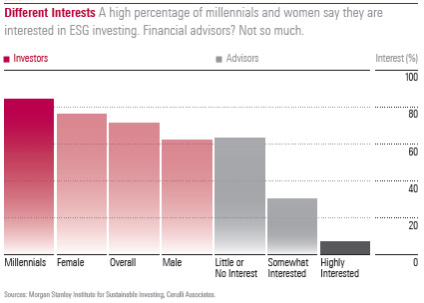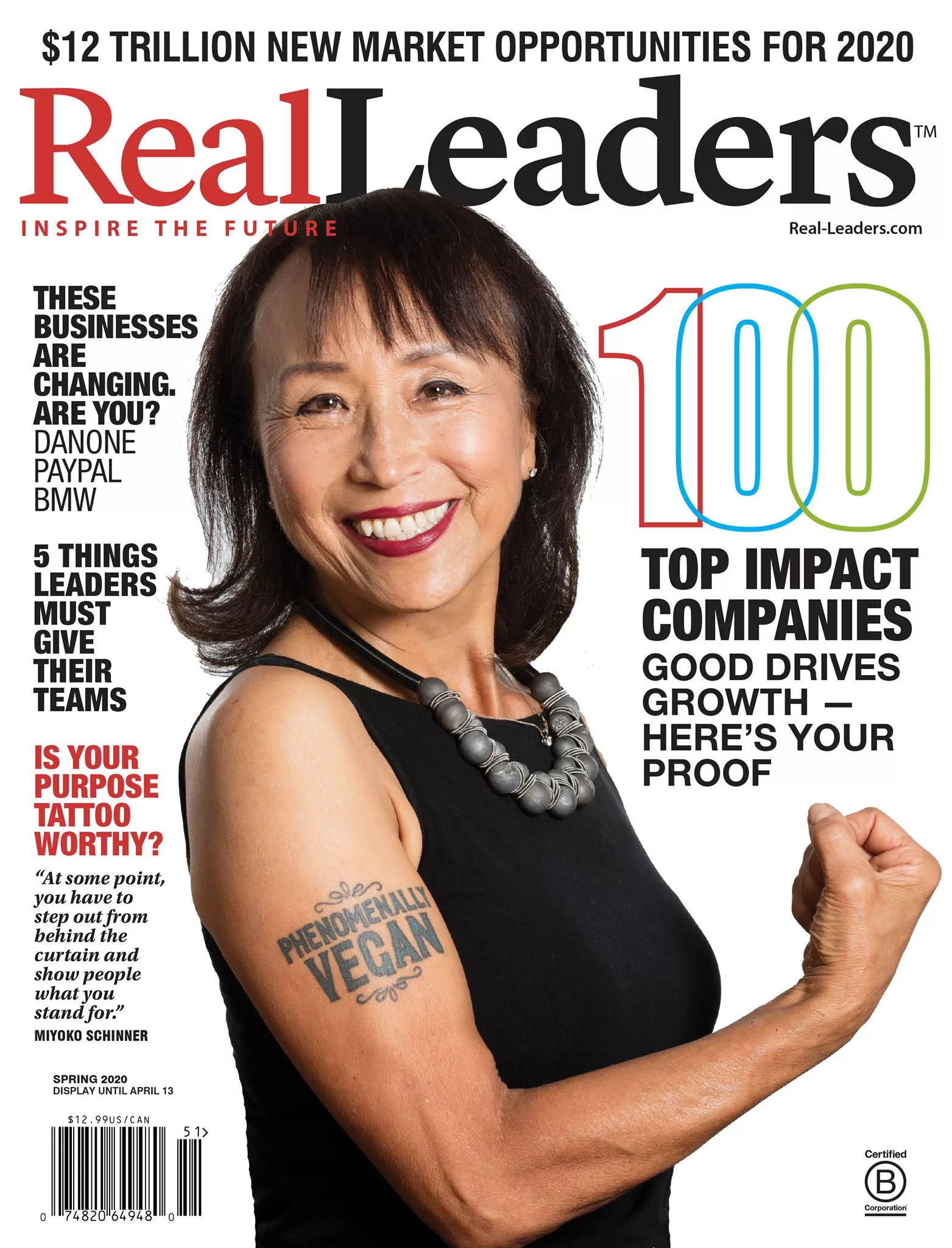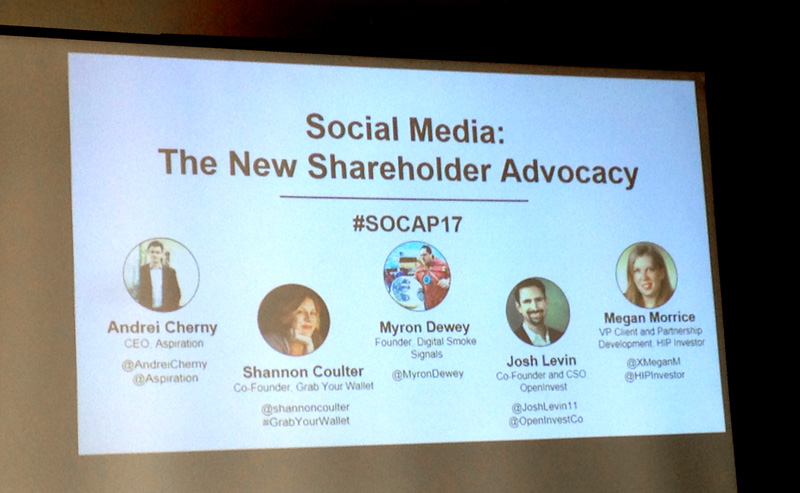A SOCAP Guest Post by Sophie van de Kerkhof
Megan Morrice attends many conferences and meetings about impact investing due to her work as client and partnership developer at HIP Investor. When she got the chance to curate a session at SOCAP she decided she wanted to take a different angle and talk about the impact people can have individually, with the help of online platforms, to steer investments and big companies towards more sustainable investment practices. Because in the end, everyone is an investor, be it through consumer activities, a bank account, or a retirement plan.
The panelists from the SOCAP17 session “Social Media: the New Shareholder Advocacy” included Josh Levin from OpenInvest, Andrei Cherny from Aspiration, Myron Dewey from Digital Smoke Signals, and Shannon Coulter from Grab Your Wallet.
 Collective Ownership of the American Economy
Collective Ownership of the American Economy
Josh Levin only realized after working in the impact investment sector for several years that there was an important group missing in the ecosystem: the crowd. He heard from banks that they didn’t want to go all in on sustainability because they’re still focused on chasing profits and they can’t make the shift until their customers really ask for it. Therefore, instead of repeating the message of the importance of impact investing among a rather small group of like-minded people (where the big institutions were not represented), he felt like it was time to open up this world by activating the crowd with the support of new technologies. The crowd is where the money is: individuals like us own 80 percent of global consumer markets and middle class retirement money is where the power is.
New technologies are making it possible for individuals to join this ecosystem of impact investing from behind their laptops. OpenInvest created an app that allows individual shareholders to vote on important issues by simply swiping right or left during shareholder resolutions. They are also the first automated investment advisor that builds you an investment portfolio with causes you care about. These technological developments are contributing to making our economy more democratic; by making it easier to tell businesses what you do or don’t want them to do with your money. This technology makes the case for owning stock of a company even if you don’t fully agree with their practices because it gives you the opportunity to influence their future practices by letting your voice be heard as a shareholder.
Then there is of course the option to fully divest from funds that are not in line with your values. Aspiration is a bank that helps you ‘make money and make a difference’ by creating investment funds that only involve companies that have proven to be sustainable with employee-friendly practices. They also offer a checking account that comes with a feature that helps you shop at places that share your social values. After a period of shopping this online feature will tell you your sustainability score (for people and the planet based on the retailer’s practices) to help you make better decisions and show you your power as a consumer every day.
Online Activism
Your online presence is another way of moving money away from practices that are harmful to people and the planet. The potential here is enormous because you don’t need a majority to catalyze change. One person can force a trillion dollar company to divest in a certain activity through social media.
An example is the reaction of Shannon Coulter to the Trump Tapes in October 2016. They made Shannon decide that she didn’t want to shop at any retailer that had connections with the Trump family. She published an online list with retailers that carried Trump products and she tweeted that she wanted to boycott these retailers hoping that others would follow. With this list and the hashtag #GrabYourWallet, she managed to reach over a billion views. With the broad attention the list got, over 20 big retailers stopped carrying Trump products to get dropped from her list. Her message to the CEOs of these companies is clear: don’t do business with a guy who grabs women by their genitals, makes fun of people with disabilities, and challenges the nationality of black presidents without it coming back and affecting your brand.
Bridging the Gap
Social media is also a way to educate the public to create a more inclusive society. Myron Dewey does this with a social network called Digital Smoke Signals that teaches people to acknowledge indigenous peoples’ rights. By attending SOCAP this year, he wanted to open doors to circles where there is no indigenous voice yet. Myron designs social networking websites where others can share content, he makes short films and documentaries, and he produces online media that lets the indigenous voice be heard. Well-known examples are the images and stories from the movement against the Dakota Access Pipeline that eventually spread around the world and sparked protests across the country.
When it comes to age demographics, the panelists agree that many millennials have already found their way to online banking platforms and social media but the 35+ segment of our society still needs a little nudge. They also see a generational shift with the younger generation caring more about having an impact and having their voice be heard. This generation consumes a lot of news and sees bad things happening, like climate change, with a government that does little to address these issues. That’s when they start thinking about what they can do as an individual and how to use their money in response to the news.
The vast majority of Aspiration customers are less than 35 years old. Andrei Cherny says that his company is driven by social media and that this is where most of their customers come from. The biggest segment of OpenInvest customers are between their thirties and fifties and the distribution of male and female customers is 50/50. Like Aspiration, OpenInvest builds their products in a way to accommodate millennials that want an awesome digital experience to help them see what impact they’re having on the world with the money they invest.
One of the reasons why the 35+ demographic is less involved in sustainable banking and impact investing might have to do with their financial advisors that this generation heavily relies on. Megan’s experience is that many financial advisors are not up to date when it comes to data on sustainable investment strategies. A recent survey, published by Morningstar financial magazine, found that over 60 percent of the financial advisors range from “a little interested” to “not interested” in ESG (environment, people, and governance) investing. This appears to be a missed opportunity because the same survey found that from the overall population, 70 percent says they’re interested in ESG investing. There is a huge gap here between people’s interests and what their financial advisors guide them to invest in.

Morningstar Magazine December/January 2016 (Sources: Morgan Stanley Institute for Sustainable Investing, Cerulli Associates)
Being interested in ESG investing and actively pursuing it are still two different things. For example, it still seems like a big step for the public, including millennials, to move their money to another bank. Individual investors have a role to play by actively asking for sustainable investment opportunities. A recent study by Morgan Stanley reports that 90 percent of millennials expressed interest in sustainable 401(k) portfolios, however this is still far from reality says Megan.
The bottom line is that although progress is being made on a higher level you shouldn’t wait for it and you should take action yourself.
 Sophie van de Kerkhof recently moved from Amsterdam to San Francisco. She previously worked at the World Wildlife Fund on marine conservation issues and she contributed to the green energy transition in the Netherlands by working as a solar consultant at two solar companies.
Sophie van de Kerkhof recently moved from Amsterdam to San Francisco. She previously worked at the World Wildlife Fund on marine conservation issues and she contributed to the green energy transition in the Netherlands by working as a solar consultant at two solar companies.

 Collective Ownership of the American Economy
Collective Ownership of the American Economy

